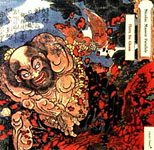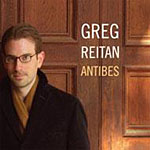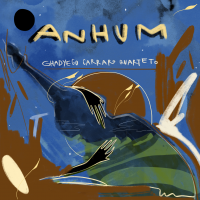Home » Jazz Articles » Interview » Joey Pero: Breaking Sound Barriers
Joey Pero: Breaking Sound Barriers
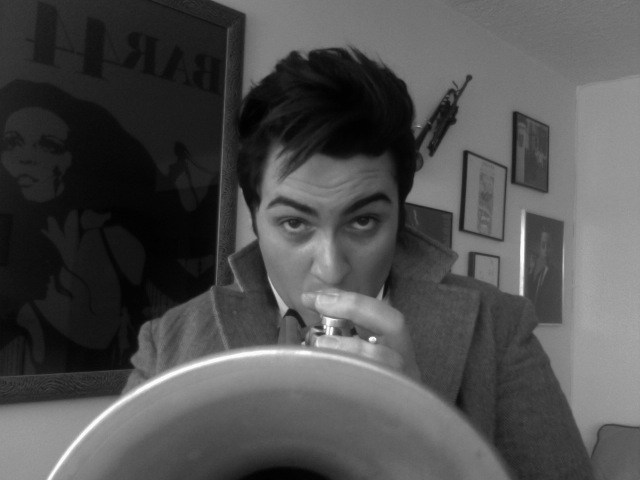
Joey Pero—trumpeter, vocalist, composer, and educator—draws people to him with his infectious passion for life, love, and all things music. This 28 year-old dynamo has been the talk of the trumpet world, and recently the town, with his bravura performance on Resonance.
Originally from upstate New York's Batavia, Pero seemed predestined for some kind of musical life. His father, also Joseph, played baritone horn in the local drum corps. His mother, Jeanne, knew something was "up" musically when she, eight months pregnant, "took" him with Dad to hear the great Maynard Ferguson scream away in concert. And (if you will allow a mother a bit of maternal license) according to Jeanne, the yet-to-be-born Joey Pero leapt to the sounds of Ferguson's stratospheric forays.
The Pero phenomenon—and it is a fast-developing one at that—started taking shape when Pero took up trumpet at age 11 and, within one year of study, was soloing live, picking off high Gs to the astonishment of his drum corps colleagues. The kid was a natural performer. Sound unbelievable? The video below will provide the evidence.
Joey Pero entered the world of high-energy pageantry drum corps, performing with various groups including Genesee Quest, Ghost Riders, and The Empire Statesmen. His talent and reputation as a special performer and soloist grew very rapidly. Exposure to various ensemble types followed. He was a member of his All-County and All-State Band, Orchestra and Symphonic Band, the Rochester Youth Orchestra, and the Roberts Wesleyan College Wind Ensemble. Honors also included being named Soprano Trumpet Individual Champion three years in a row, from 2000-2002.
It logically followed that Pero would later attend Juilliard. While there, he studied trumpet under the renowned Ray Mase. Pero's incredible trumpeting drew the eye of an individual who became a mentor, and to whom Pero has been compared: award-winning trumpeter and composer Wynton Marsalis. Marsalis took a special interest in Pero's development and gave lessons to Joey for a number of years. The teacher-student relationship developed into a long-standing friendship to this day. Years later, Pero would be seen performing with a magnificent, 24-karat gold-brushed Monette trumpet, a gift from his mentor.
Never seeming content to rest on his laurels, Pero continued his studies at the New England Conservatory in Boston, where he took lessons with Boston Symphony principal trumpeter Charles Schlueter. Schlueter became a profound influence on Pero, further refining his technique and musicianship. "Whether playing 16th notes at blinding speed or double E flats with ease and tonal perfection, Joey Pero is at ease with his trumpet and embodies the definition of an instrument acting as an extension of one's self," Schlueter was quoted as stating.
The Boston experience also allowed Pero to occasionally study and perform at the Berklee College of Music, an institution world-renowned for its jazz ensemble and jazz composition programs. At Berklee, young Pero had the opportunity to perform with musicians steeped in jazz. A stint in Maynard Ferguson's Big Bop Nouveau would further hone Pero's jazz and scream chops. On occasion, Ferguson would feature "rising star" trumpeters to perform the leader's own feature solo selections. The YouTube video of Pero's opening to Ferguson's "Macarthur Park" scream solo is a favorite of trumpeters around the world.
With drum corps, Juilliard, New England Conservatory, Berklee, and Ferguson as bases in his incredible arsenal, and with the brilliant Charles Ressler involved as executive producer and creative director, the planning and practicing for Pero's home run on Resonance began in earnest in 2008. Here, Joey Pero and Charles Ressler share thoughts about Resonance.
All About Jazz: What's Resonance all about, and why?
Joey Pero: Resonance is an all-powerful force that can do anything from emit sound from a crystal wine glass, take down a bridge, or be the human experience itself. "Resonance" is the infinite levels of relatedness we all share. It is about connecting to the components that make us all the same. It is compassion, love, empathy, sorrow, anger, joy, et cetera. Resonance is all about the listener, just as my performances are all about the audience. You don't have to be an aficionado of classical, jazz or pop music to enjoy the record. There's something for everyone, and the breaking of genre barriers has to do with the things that have impacted my life.
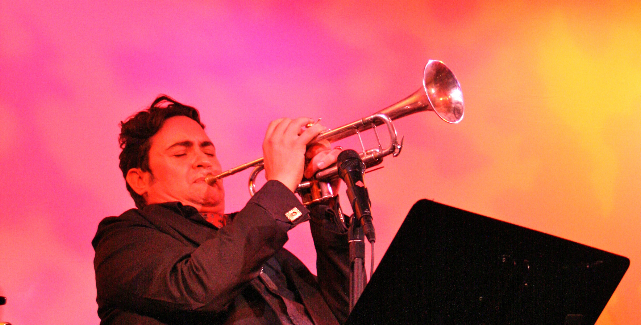
It's almost like I created a playlist for the listener. All the things that I find imperative about living life are included, right down to packaging being extremely environmentally sound: everything is made with vegetable dye, recycled paper, and we even found a use for old vinyl. We packaged the album to create a sense of nostalgia, right down to the vinyl finish to make it look like the LPs I grew up putting on the family record player. It is very important to me to pay homage to what came before, as inevitably it is what has inspired me.
AAJ: Why the title "Resonance?"
JP: It came quite naturally! From the record's inception, we put a large amount of weight on relating to our listener. When we were in pre-production, we still hadn't come up with a record title. Charles and I had been throwing around so many ideas. Then it occurred to me that the word we kept using was "resonate." I said, "Why don't we call it "Resonance," and it was a unanimous "yes." Every aspect of the record has a deeper meaning, even if we didn't know it at the time, because we so carefully tried to embed a larger truth, almost like a novel. What ended up happening is that, to this day, we discover new things which forward the stories. In this way, our fractals have sort of exploded. Our truth always rang through and the music remained true to its original philosophical intention.
Resonance has several streams of continuity weaved into its makeup, ranging from musical to biographical to the aesthetics. The opening "guzinta" prior to "The Finest Romance" is from Aaron Copland's "Short Symphony." A guzinta is a concept that Charles and I created that acts a short musical interlude, acting as a musical Shakespearean Fool guiding you through the story. "Short Symphony" was the last piece of extreme difficulty that Copland composed. After that point, he constructed his music with the intention of the listener and musician to resonate with his music. This was met with the rave reviews, and Aaron Copland became Aaron Copland—a very interesting conclusion!
Resonance is a musical performance achievement from a number of standpoints. It combines examples of Pero's phenomenal classical trumpeting technique and musicianship (the "Arutunian Concerto," Excerpt from Bach's "Goldberg Variations"), his extraordinary straight-ahead jazz playing ("The Finest Romance," Brubeck's "Blue Rondo"), and other aspects that cross over into areas of jazz, electronic music, classical, world music—you name it. The pieces intertwine intelligently as if they were a Moebius strip.
AAJ: What were the key challenges of this recording effort?  JP: The challenges on this recording encompassed the range from technical to musical to personal. I believe this is part of the process that all musicians inherently face. One is always excited to conquer the many challenges that await a recording artist, but putting yourself out there is not always easy, especially when you know that who you are changes accepted paradigms. And you are not sure how this will be met. In the end, I just had to follow my instincts and use my voice and vision, trusting that a whisper of truth is louder than screaming lies.
JP: The challenges on this recording encompassed the range from technical to musical to personal. I believe this is part of the process that all musicians inherently face. One is always excited to conquer the many challenges that await a recording artist, but putting yourself out there is not always easy, especially when you know that who you are changes accepted paradigms. And you are not sure how this will be met. In the end, I just had to follow my instincts and use my voice and vision, trusting that a whisper of truth is louder than screaming lies.
One of the challenges of Resonance was creating cohesiveness in the tunes so that they worked from a musical standpoint. It's a fine line between sounding cool and hokey or gimmicky, especially when you know that what you are doing is breaking boundaries down in order to entertain and delight. Everything had to be seen though elegant eyes, which often meant re-recording something or holding off until I knew in my gut it was right. Because of this, the record, which was due out on Labor Day 2008 actually launched in April of 2009. It had to go out right or not at all.
Perhaps the most incredible performance on the CD is Pero's performance of the Bach Partita no. 2, BMV1006 "Preludio." The piece was written by J. S. Bach in 1720 for violin. Prior to its inclusion on Resonance, the selection had never been performed or recorded on trumpet. Thus Pero, who took over a year to perfect the intricate tonguing and articulation required in the piece—not to mention the "circular breathing" needed to play extremely lengthy lines—was making trumpet performance history. Mendez, Andre, Nakariakov, Marsalis, Vizzutti: none of these great masters in the classical trumpet pantheon, to a man, have ever attempted this.
Here is Pero in an impromptu solo performance of "Partita."
AAJ: The "Partita"—a challenge and a performance breakthrough, yes?
JP: The "Partita"'s biggest challenge was overcoming the fear of playing something never done on a brass instrument. Once I got past that, it was all good. Of course, playing the live version posed a whole new set of fears that I deal with day to day. It's the kind of piece where anything could happen, and certainly will be a lifelong love of mine. When Charles (Ressler), Peter Fish (co-producer), and I were creating the concepts for the record, I went to see Wynton Marsalis to ask his advice. One of the things he told me that evening was to record the hardest piece first. So, we did "Partita" first in a giant room with 15 to 17 mics ranging in distance and height. Talk about a daunting first recording. Ultimately it was great advice, and I am really happy with how both "Partita" and the whole record turned out. "Partita" will stay with me through my life and I certainly think at some point I will re-record it when I am older, wiser, and have a different breadth to bring to it.
With such a diverse and challenging "crossover" repertoire to be recorded, Pero and Ressler drew upon the talents of a diverse group of outstanding musicians. Jazz vocal stalwart Freddy Cole sparked "The Finest Romance;" well-known cabaret chanteuse Daryl Sherman is featured on a super funky-hip cover of Gnarls Barkley's "Crazy," guitarist Jack Antonoff on the "Arutunian Concerto," Phoebe Snow on "Birth," and percussionist Simon Boyar on "Blue Rondo." All joined forces to make Resonance an exciting, intelligent and musically brilliant recording. With proper exposure, Resonance could easily take its place with the recently-named Grammy nominations.
If recording Resonance in the studio wasn't challenging enough, Pero and Ressler have taken the act and brought it forth into live club concert performances. The preliminary reviews have been outstanding. The group has recently played to rave reviews at two of New York finest rooms, The Metropolitan Room and Feinstein's at Loew's Regency. In the live performance format Pero and crew have, astonishingly, taken Resonance as recorded without any concession to the live venue—an incredible achievement given the musical, orchestral and performance requirements of the selections. In live concert, Pero and the group are even more exciting and high-energy.
In addition, Pero live has an Elvis-like attraction as he performs brilliantly both as a trumpeter and vocalist. He has a fine vocal style, something not showcased on the CD. His incredible talent as a performer is further enhanced by his likeability onstage and overall interplay with both his supporting players and the audience. At the Feinstein's performance, Pero—seemingly like a high-wire artist and with the casualness of a Dean Martin—blew the jazz classic "Cherokee" brilliantly, as he played the classic Clifford Brown solo note-for-note! Standing ovations were almost matter-of-fact given the brilliance of the performance.
AAJ: Resonancethe CD is beautifully engineered and produced—and impeccably performed. How will it differ in live shows, if at all?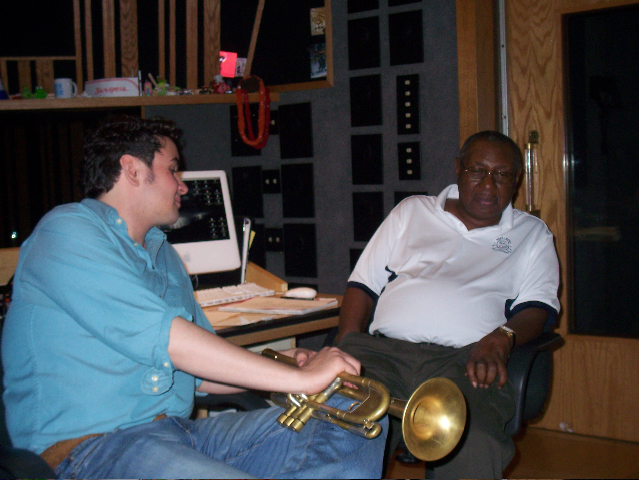 Joey Pero with Freddy Cole
Joey Pero with Freddy Cole
JP: For us, it's business as usual. There is a whole other world of fun involved in bringing the music to the live arena. With the voicing of piano, drums, bass, marimba and trumpet, we have a lot of new sounds coming from the bandstand. The main objective isn't to emulate the record, but to enhance and develop it! I do think that ultimately, if you love the record, the live show is even better because there are so many other layers of resonance you can achieve in a live setting.
Charles Ressler: This always cracks me up, because when people see the live show they say to me, "Wow, I had no idea that Joey would be able to play the whole record as it is recorded. It blew me away!" I think to myself, what did they expect? I think the live show is very similar to the record, maybe with a bit more to offer in terms of getting a glimpse into Joey's spirit. Joey's ability to resonate with his audience consistently amazes me. The show is elegant, fun, thought-provoking, engaging, and so much more. It makes you leave feeling really good.
AAJ: What's your approach to live performances?
JP: Entertainment, entertainment and more entertainment! We're dedicated to a return to entertainment-based performance. Our goal is to cover all angles of what that might mean for an audience member.
AAJ: Resonance strikes me as being almost operatic in scope. Ever think about incorporating dance or multimedia with a "resonance" effort? What about film scoring?  Joey Pero and his parents with Wynton Marsalis
Joey Pero and his parents with Wynton Marsalis
JP: Resonance is a rock opera and was conceived as one from the very beginning. I am excited to explore all possible avenues. We would be very excited to use some of the record as music for film and television, when the stars aligned properly. Part of Resonance is having trust in the universe around you. All the opportunities are coming one by one and it is a very exciting time. I would especially like to see dancers using it, as it adds a dimension of art to the music that is not already there. Certainly there are many cool things to come.
CR: Resonanceis part of a three-record concept, a trilogy. When we began work on pre-production, it became clear that there was no way to tell the whole story, as each individual phase of being has to be given equal respect: the story of life lived. Joey is definitely a Chautauqua, or storyteller. I have been working diligently at opening up the avenues necessary to stage the Resonance concept and music as a large-scale production. I have been in talks with several media outlets to this end. It all must remain under wraps for now, but let's just say something amazing is coming.
As with every project I work on, there is a level of perfectionism that must be met. So you can expect that this will take time, and that when it does launch, it will be magnificent in scope as well as flawless in execution. Joey, Simon Boyar, Peter and I all work to this same level: refinement, honing, and ultimately creating an immaculate product that stands the test of time. It is really awesome how each of us serve as a check and balance for the other in this process, and ultimately, when "Resonance" is ready to be taken to the stage in a new way... you can bet it will inspire awe. How easy is my job when my colleagues are unparalleled in their genius and artistry?
A recent review compared Joey Pero to trumpeters Allen Vizzutti and Wynton Marsalis. The parallels between these masters and Pero are uncanny. These trumpet giants all straddle highly diverse dimensions of trumpeting and composition. Marsalis, of course, has the Lincoln Center Jazz Orchestra, classical performances, a compositional Pulitzer and film scores under his belt. Vizzutti travels the world performing classical and modern trumpet repertoire and, on occasion, dives into jazz soloing. What might be next in store for Joey Pero?
AAJ: Do you plan to compose more? What's coming performance- and goal-wise?
JP: I go though periods of what I call "highly innovative spurts." During that time I dedicate my energy to writing the melodies and songs that pop into my head. Nature has recently been a huge inspiration to me. I feel as though the music is already there, I just grab it. I can construct tunes and melodies myself, but I believe my best work is notated from the unknown. Tunes such as "Wrapt" were birthed from the life situations I was experiencing at that time. Moreover, I consider my goal to be the continuation of what I do now; that may look different at future points of my life. The evolution of my reach as an artist is imperative. And my ability to educate, inspire, and learn are the most important to me in the grand scheme. On coming records, you can expect more original works. You can also expect to see the advancement of the live performances.
AAJ: Well, based on the initial reaction to and reviews of Resonance, you've hit a home run. How do you top that?
JP: Thanks, home runs are a good thing! As I said before, I will continue to do what I do, always aiming to better myself as a person and as an artist; to grow. Live more life, practice more hours, and believe wholeheartedly in what I put out to the world. I have started pre-production on my forthcoming release; to that end, Charles will be producing this as well. He has an uncanny ability to reach inside an artist's heart and soul and pull out their voice. He is also working with Simon this year, which is turning out to be an epic work. I can't say a lot about my new work, but it is a continuation on the Resonance concept, and there is much growth to be seen on it.
CR: At the end of the day, one of the things we know and can be reminded of by the Resonance story is that when it comes to growth, you can never have enough. If we were to think about "topping" Resonance, we would be frozen and daunted. What we always do is bring our hearts, souls, and endless work ethic to the table to be sure that we are each being ourselves. What you can be sure of is that the next record will be ever more true, ever more filled with the things we have learned... This is our commitment to ourselves, each other, our community, and our world.
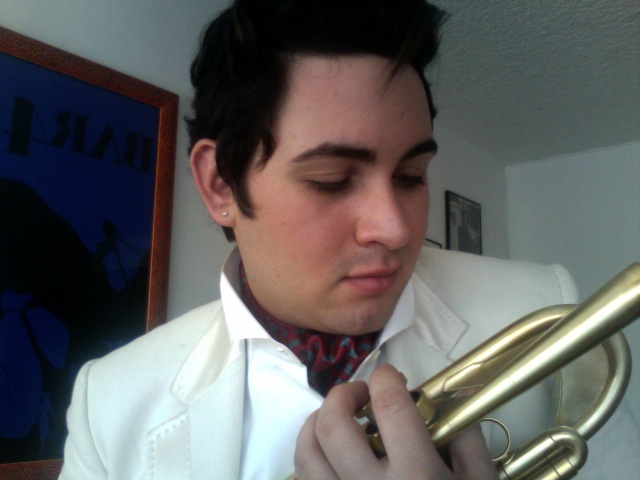
Joey Pero certainly seems to be on a comet's path to stardom. With Resonance in his pocket, incredible musical weapons at his command, brilliant artist management, and a marvelous A-1 entertainer's personality to boot, Pero is destined to have his star shine and soundly resonate in the entertainment world for a long time to come.
Pero will continue to perform selections from Resonance in concert. A future performance is scheduled for Joe's Pub in New York on January 9, 2010. In addition, Pero has been invited to be a featured performer at the International Trumpet Guild's Annual Conference in Sydney, Australia in June 2010.
Selected Discography
Joey Pero, Resonance (Resonance Music Group, 2009)
Photo Credits
Courtesy of Joey Pero
Tags
PREVIOUS / NEXT
Support All About Jazz
 All About Jazz has been a pillar of jazz since 1995, championing it as an art form and, more importantly, supporting the musicians who make it. Our enduring commitment has made "AAJ" one of the most culturally important websites of its kind, read by hundreds of thousands of fans, musicians and industry figures every month.
All About Jazz has been a pillar of jazz since 1995, championing it as an art form and, more importantly, supporting the musicians who make it. Our enduring commitment has made "AAJ" one of the most culturally important websites of its kind, read by hundreds of thousands of fans, musicians and industry figures every month.



